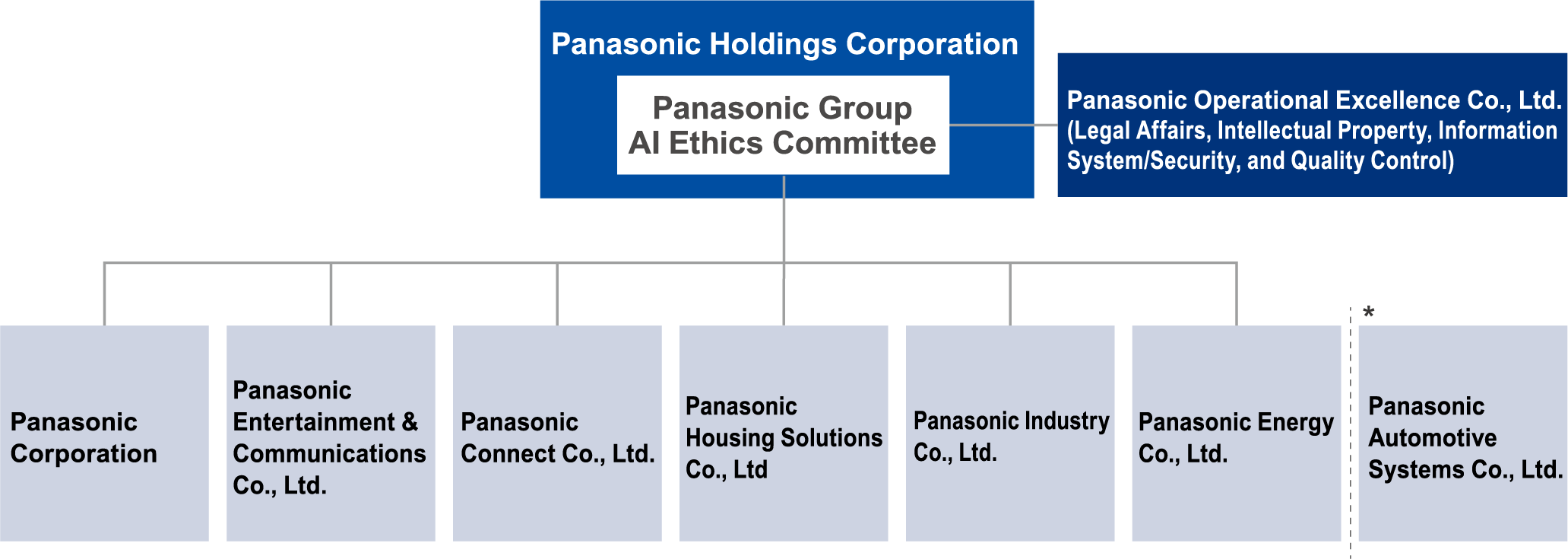It has often been pointed out that while new technologies can offer solutions for different kinds of issues and enrich people’s lives, the risks those same technologies bring have the potential to lead to human rights issues like violations of privacy, more intense illicit surveillance, and discrimination by algorithms that have been trained on biased data. The Panasonic Group considers our approach to AI ethics as “a promise to the rest of the world to apply AI in ways that are human-centered and that respect human rights,” and we work to apply that approach to AI ethics to the ways in which we develop and operate our AI products and services, as well as our AI utilization.
Policy
The Panasonic Group’s policy with regard to AI is to work to protect the safety and interests of all stakeholders, including any customers involved, and minimize the impact of risks throughout the AI utilization life cycle from the planning of AI products and services up to their sale and use. By fostering trust in our AI technologies and products in this way, we will encourage further AI utilization, through which we can make a greater contribution to society.
In order to do this, we have defined our AI Ethics Rules (which apply to the entire Group), and we conduct AI ethics activities to mitigate and avoid risks that can come with improvements to those technologies and processes by evaluating and managing risks related to AI ethics so that our AI utilization life cycle will function appropriately with reference to our AI Ethics Rules as well as relevant laws, regulations, and ethical guidelines for each country. In 2022, we established and published our AI Ethics Principles.
Promoting Organization
AI ethics activities for the Panasonic Group are driven by the Group CTO (Executive Officer), our head of AI operations (as of August 2025).

* Panasonic Holdings Corporation (“PHD”) has formed a strategic joint partnership with the Apollo Group in the business of Panasonic Automotive Systems Co., Ltd. (“PAS”). As a result, PAS is no longer a consolidated subsidiary of PHD, and Star Japan Holdings (including PAS as a sub-subsidiary) has become an equity-method affiliate of PHD. For more information, please refer to the following news release.
PHD and PAS will continue to collaborate in promoting AI ethics activities.
The AI Ethics Committee has been established within the Panasonic Holdings Corporation by the Group CTO, comprising staff members in charge of AI ethics and members from other related departments like legal and information security. The Committee provides the Group with systems and measures to be implemented in relation to AI ethics activities and provides operating companies with support for their AI ethics activities as well as understanding, reviewing, and formulating countermeasures against risks. Each operating company also has persons in charge of AI ethics, and these individuals cooperate with the AI Ethics Committee to carry out activities that fit the business and technologies of each company.
For extremely high-risk AI projects or those with manifest risks, the AI Ethics Committee will propose countermeasures, report them to the AI Ethics Committee Chair and the operating companies, and then collaborate with the operating companies on their implementation.
Education
The AI Ethics Committee provides educational materials on the basics and promotion of AI ethics to enable all our employees to work in line with the Group’s AI ethics principles.
Since 2022, the AI Ethics Committee has been providing e-Learning courses on AI ethics for all employees in our domestic group companies every year. We also post e-Learning materials to our Intranet site so that all employees, including those in overseas companies and temporary staff, can strengthen their understanding whenever necessary.
Risk Assessment
In 2022, Panasonic introduced a monitoring system to identify the ethical risks of AI in Group products. The AI Ethics Committee collects risk assessment results of operating companies through the Group employee survey results and the groupwide risk check system and analyzes them to understand any risks within the Group. For matters that have been determined to pose a high level of risk, the Committee sets up review teams to conduct risk reviews or otherwise addresses them across organizational divisions.
External Cooperation
The AI Ethics Committee also conducts research and outreach related to AI ethics in various ways, including participation in committees at external institutions that research AI ethics, as well as within the community, academic, and public sectors. Panasonic participated in drafting the Governance Guidelines for the Implementation of AI Principles through the expert group laid out by Japan’s Ministry of Economy, Trade and Industry. We are further strengthening our links with external parties through our membership in the AI Alliance, a global alliance on AI.



